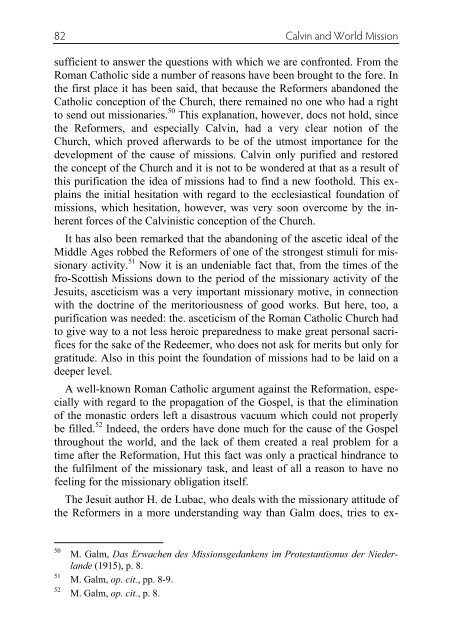Calvin and Missions - World Evangelical Alliance
Calvin and Missions - World Evangelical Alliance
Calvin and Missions - World Evangelical Alliance
You also want an ePaper? Increase the reach of your titles
YUMPU automatically turns print PDFs into web optimized ePapers that Google loves.
82 <strong>Calvin</strong> <strong>and</strong> <strong>World</strong> Mission<br />
sufficient to answer the questions with which we are confronted. From the<br />
Roman Catholic side a number of reasons have been brought to the fore. In<br />
the first place it has been said, that because the Reformers ab<strong>and</strong>oned the<br />
Catholic conception of the Church, there remained no one who had a right<br />
to send out missionaries. 50 This explanation, however, docs not hold, since<br />
the Reformers, <strong>and</strong> especially <strong>Calvin</strong>, had a very clear notion of the<br />
Church, which proved afterwards to be of the utmost importance for the<br />
development of the cause of missions. <strong>Calvin</strong> only purified <strong>and</strong> restored<br />
the concept of the Church <strong>and</strong> it is not to be wondered at that as a result of<br />
this purification the idea of missions had to find a new foothold. This explains<br />
the initial hesitation with regard to the ecclesiastical foundation of<br />
missions, which hesitation, however, was very soon overcome by the inherent<br />
forces of the <strong>Calvin</strong>istic conception of the Church.<br />
It has also been remarked that the ab<strong>and</strong>oning of the ascetic ideal of the<br />
Middle Ages robbed the Reformers of one of the strongest stimuli for missionary<br />
activity. 51 Now it is an undeniable fact that, from the times of the<br />
fro-Scottish <strong>Missions</strong> down to the period of the missionary activity of the<br />
Jesuits, asceticism was a very important missionary motive, in connection<br />
with the doctrine of the meritoriousness of good works. But here, too, a<br />
purification was needed: the. asceticism of the Roman Catholic Church had<br />
to give way to a not less heroic preparedness to make great personal sacrifices<br />
for the sake of the Redeemer, who does not ask for merits but only for<br />
gratitude. Also in this point the foundation of missions had to be laid on a<br />
deeper level.<br />
A well-known Roman Catholic argument against the Reformation, especially<br />
with regard to the propagation of the Gospel, is that the elimination<br />
of the monastic orders left a disastrous vacuum which could not properly<br />
be filled. 52 Indeed, the orders have done much for the cause of the Gospel<br />
throughout the world, <strong>and</strong> the lack of them created a real problem for a<br />
time after the Reformation, Hut this fact was only a practical hindrance to<br />
the fulfilment of the missionary task, <strong>and</strong> least of all a reason to have no<br />
feeling for the missionary obligation itself.<br />
The Jesuit author H. de Lubac, who deals with the missionary attitude of<br />
the Reformers in a more underst<strong>and</strong>ing way than Galm does, tries to ex-<br />
50<br />
M. Galm, Das Erwachen des <strong>Missions</strong>gedankens im Protestantismus der Niederl<strong>and</strong>e<br />
(1915), p. 8.<br />
51<br />
M. Galm, op. cit., pp. 8-9.<br />
52 M. Galm, op. cit., p. 8.

















